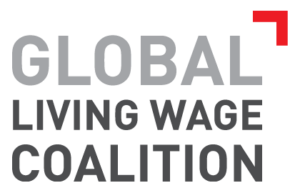The Global Living Wage Coalition (GLWC) extends its solidarity to the workers of Bangladesh and their supporters advocating for higher wages. We support workers in their demand for decent wages, which are in line with independent Living Wage Benchmark estimates published by the Anker Research Institute and GLWC. There have been reports of unions and workers leveraging these benchmark estimates in their negotiations, and they have our full support.
We stand with workers and unions demanding that their rights to freedom of association and collective bargaining are implemented, protected, and respected across the industry, including in export processing zones. These enabling rights must be effectively recognized for sustained and meaningful wage improvement.
The proposed minimum wage increase of 52% still leaves workers a long way from a decent wage. Our latest update estimates the monthly living wage for Dhaka City at BDT 25,497—double the current proposal. Accounting for inflation and likely increases to rental prices and other costs, the proposed increase will be far less in real terms.
There is a clear role for supply chain partners to work collectively to support workers’ rights to a decent standard of living and to advance wages beyond legal minimum levels. The GLWC calls on industry and policy-makers to use the publicly available credible living wage estimates to take action toward closing living wage gaps for workers in the garment sector. Actions should include committing to pay workers the living wage differential, improving in-kind benefits that workers value, and implementing responsible sourcing practices such as supporting improved forecasting and planning, more transparent collaboration with suppliers, and adopting pricing strategies that ensure suppliers are able to pay decent wages to their workers.
Improved social security benefits and support would also help ensure workers can attain a decent standard of living. Both individual and collective accountability and actions are needed. Governments, consumers, brands/buyers, producers/suppliers, investors, and civil society all have roles to play in ensuring that garment workers are fairly treated and compensated. We encourage everyone, as we are all connected to or affected by the garment industry, to accept responsibility for their role in ensuring a decent standard of living for workers.
Relevant resources from GLWC members
- Living Wage Update Report: Dhaka and Satellite Cities, Bangladesh, 2023
- Living Wage Benchmark Report: Dhaka and Satellite Cities, Bangladesh, 2016
- Fair Labor Association’s Bangladesh Wage Trends 2016 Report
- Fair Labor Association’s Bangladesh Wage Trends 2020 Report published by the UN Global Compact
- Social Accountability International’s Responsible Purchasing Practices Guidance for Buyers
- Social Accountability International’s Mutual Buyer Supplier Code of Conduct
Photo credit: Crozet M. / ILO





